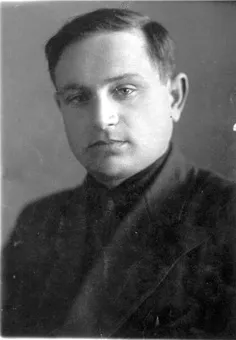Evgenia Wainshtock’s father Miron Wainshtock
My father Miron Wainshtock demobilized from the Red army. This photo was taken in Kiev in 1938.
In 1934 my father was sent to serve in the Far East (about 8000 km from Kiev) where my mother and I followed him. We lived in a room there and I remember a portrait of Leninon the wall. There was my parents' bed, my bed and a table in the room. My mother worked at the kindergarten and my father was a commanding officer. In summer my mother and I went to Kiev. My father was awarded a complete volume of Lenin's works and a bicycle for his excellent performance of work. My father was very intelligent. But in 1937 my father's co-student and friends submitted a report on my father, accusing him of refusing to buy a state loan lottery! (Editor's note: The Soviet power was in bad need of money for development of its industries and issued a state loan lottery in late 1920s. People were forced to buy these loan lotteries).
My father told me later that he had seen and read this paper My father was arrested when my mother and I were in Kiev; he was tortured - every ten minutes he was called to interrogation,they didn't let him sleep. It lasted for about a month. They wanted my father to sign a paper confirming that he was guilty to have a document to sentence him, but my father was a strong person and he didn't accept any accusations.
After he was released he demobilized and returned to Kiev. He became trade union leader at the container factory. Director of this factory was my father's best friend. We lived with my mother's family in Basseynaya Street. In 1938 I went to the first form of Russian secondary school in Kiev. I enjoyed studying and my father spent a lot of time with me. My father was an atheist, but he was very tolerant about my grandparents' faith. He was a convinced communist and was a member of the Communist party since he studied at the military college.
In 3 months before the war my father was sent to fortify the borders in Western Ukraine. He came to Lena's funeral in Kiev in a week before the war. The war began on 22 June 1941 my father put on his uniform and went to the registry office. There was a kerosene storehouse in the yard and when women that were standing in line saw my father wearing a uniform they burst into tears thinking about their sons, husbands and fathers that were to go to the war. My father stayed with us for another day while his military unit was being formed and then left for the front. We didn't hear from him for a long time.










